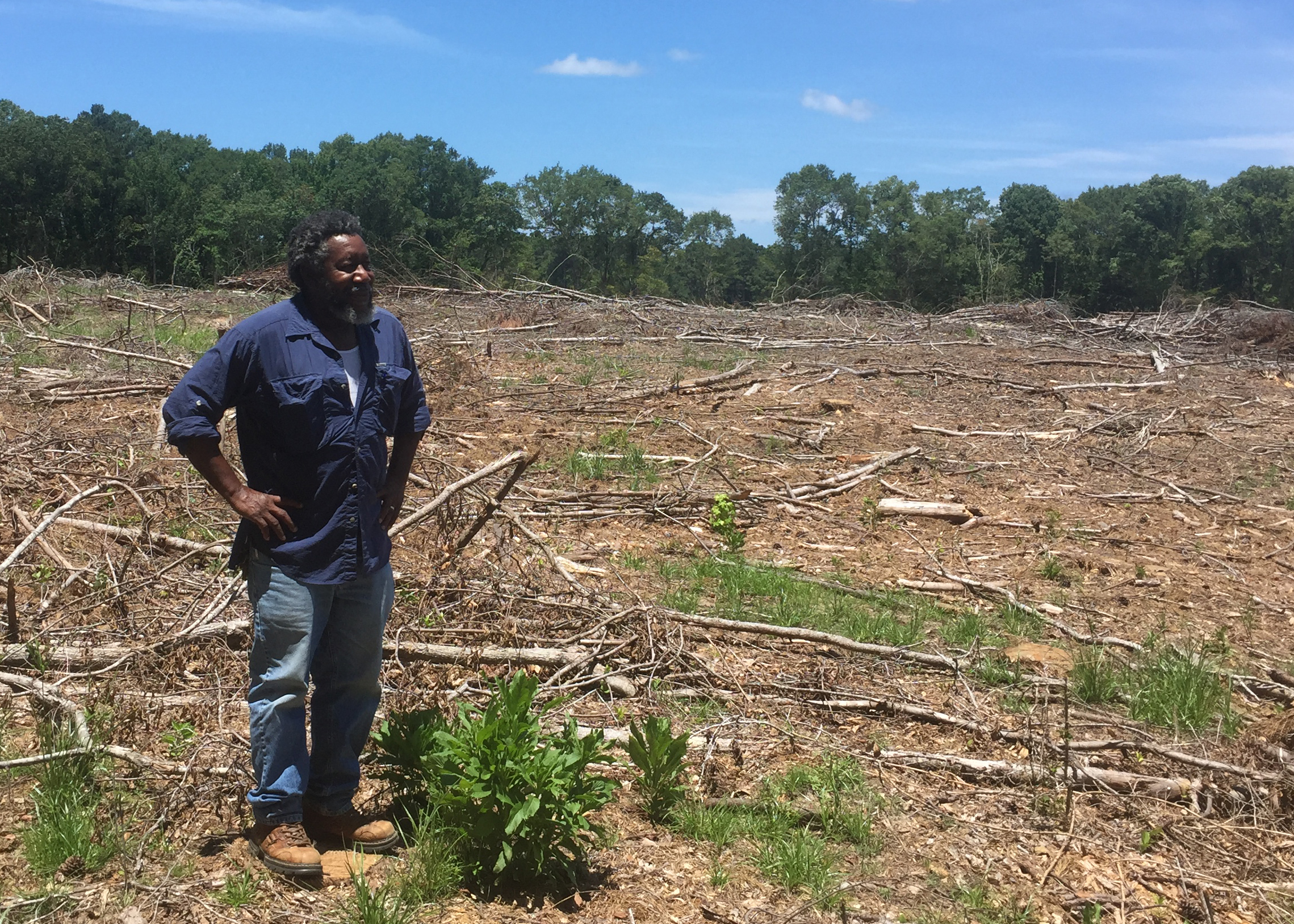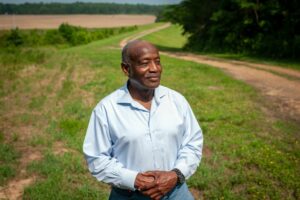
By Will Hehemann – June 23, 2022 – Socially-disadvantaged farmers in Arkansas benefit from a decades-old partnership between the University of Arkansas at Pine Bluff (UAPB) and the U.S. Department of Agriculture Natural Resources Conservation Service (NRCS), says Charley Williams, a UAPB alumnus and veteran NRCS soil conservationist. This cooperation helps empower a broad range of producers in the state, including those with limited financial resources, those who are new to farming, and women, veteran and minority farmers or ranchers.
“Cooperation between UAPB and NRCS started a long time ago,” Williams said. “UAPB began inviting NRCS personnel to its annual Rural Life Conference to share important information about USDA programs to small and socially-disadvantaged farmers.”
The partnership between the 1890 land-grant university and the USDA agency is mutually beneficial, Williams said.
“NRCS wants to get timely information out to the public and provide resources to farmers and landowners to aid them with conservation,” he said. “UAPB wants to help socially-disadvantaged farmers apply conservation practices to their land so their operations will be more sustainable and profitable. So, it makes sense that these two entities would work together to reach out to minority farmers – a group that has been historically underserved by USDA programs in the past.”
In addition to bolstering conservation efforts, this partnership also has a positive effect on the producers’ bottom line, Williams said. The official NRCS mission is “helping the people help the land.” However, he said it is important to make an addition to this statement when thinking about outreach to small producers.
“We at the UAPB Small Farm Program like to say our mission is ‘helping the people help the land to help the people,’” he said. “It is important for small farmers to realize that by taking advantage of conservation programs, they are not only going to be benefiting their land, but also will be adding to their own economic prosperity.”
Providing direct support to producers
Williams said the partnership between UAPB and NRCS picked up momentum in 2010 when he was appointed coordinator for the Arkansas StrikeForce initiative, a project that aims to implement effective conservation and housing programs in impoverished communities and help residents take advantage of farm loans.
“We were tasked with increasing the participation of socially-disadvantaged farmers in USDA programs, and we had to show our progress,” Williams said. “Being a graduate of UAPB, I got in touch with the head of the UAPB Small Farm Program, Dr. Henry English. I told Dr. English that this could be a potential grant opportunity – UAPB could receive funds to help small farmers apply for USDA funds.”
Dr. English saw potential in Williams’ vision. And during discussions with NRCS program coordinators, Williams explained that UAPB could essentially act as a “technical service provider” on behalf of the agency.
It was at this point that the NRCS started training UAPB Extension personnel to help producers apply for the NRCS Environmental Quality Incentive Program (EQIP). EQIP financial assistance allows producers to install conservation practices in areas such as improving irrigation efficiency, promoting soil health or restoring pastureland on their farm or ranch. In some cases, access to assistance has helped producers keep their family farm in business.
“Now we are to the point where UAPB has a workforce of associates trained by the NRCS who are able to connect small farmers to new NRCS initiatives – everything from the installation of high tunnels to irrigation and water management,” he said. “We have a staff that includes trained foresters, conservationists and retired NRCS employees – everyone knows EQIP like the back of their hand. This is our silver bullet to success.”
UAPB’s ability to directly help transform its clients’ operations for the better was boosted tremendously when the university launched the “Keeping it in the Family” Sustainable Forestry and African American Land Retention Program in 2016, Williams said. The program provides educational resources and technical assistance to African American forest landowners to protect and retain their family land for future generations.
“UAPB’s Keeping it in the Family Program showed so much promise in terms of the number of people it could benefit, that it received its own NRCS funding code,” he said. “This means the people we provide outreach services to are able to obtain forest management plans and be approved for EQIP cost-share funding much faster than usual. This has been a game-changer – we are now seeing record numbers in terms of EQIP applications, the amount of EQIP funding awarded to farmers and the number of people served.”
Williams said he feels he used to just be a mouthpiece for NRCS and EQIP. But now, he says he and other team members of the UAPB Small Farm Program feel empowered to take direct action in getting farmers to apply conservation practices.
“When a new landowner contacts us, we learn about their operation and goals and then go on a site visit as a team,” he said. “Experts from the Arkansas Department of Agriculture – Forestry Division accompany us and write a forest management plan for the landowner. Now, that landowner essentially has a roadmap for how to apply conservation practices on their land.”
Acting as a role model for other institutions
Williams said UAPB’s success in reaching socially-disadvantaged producers has attracted the attention of other state and regional institutions and organizations. Recently, he and Dr. English have participated in planning sessions hosted by universities and agencies hoping to start projects similar to UAPB’s Keeping it in the Family Program.
“There is no other group besides UAPB that has such a strong connection with the state’s socially-disadvantaged farmers,” Williams said. “The people on our team have the training and personality to earn the trust of producers who have never participated in USDA programs before. It takes a special personality to look these farmers in the face and tell them that the USDA is going to help them develop their land and not take it away.”
Williams said mistrust of USDA programs is still an issue among minority and limited-resource producers. And some producers think EQIP and other programs offered through the U.S. Farm Bill are “freebie programs.”
“But that is not the case,” he said. “I tell producers that these programs are funded thanks to their own tax dollars. Since they’ve already paid into these programs, why not take advantage of them? I remind them that this is a partnership – the USDA wants to partner with you to keep your land productive.”
Williams said there is also a cliché among USDA agencies that minority and limited-resource audiences are hard to reach and connect with.
“I always tell them, ‘Give me the phone – give them my number,” he said. “In our work, we have to remember we are working with a group that has been left out for a long time. Sure, connecting with them might take some effort, but it is possible. The success of the UAPB Small Farm Program in transforming the operations and lives of so many Arkansas farmers is proof of that.”
The University of Arkansas at Pine Bluff offers all its Extension and Research programs and services without regard to race, color, sex, gender identity, sexual orientation, national origin, religion, age, disability, marital or veteran status, genetic information, or any other legally protected status, and is an Affirmative Action/Equal Opportunity Employer.
#30#



 Sign up as a free Arkansas Delta Informer digital subscriber and get breaking news and weekly news roundup in your inbox.
Sign up as a free Arkansas Delta Informer digital subscriber and get breaking news and weekly news roundup in your inbox.